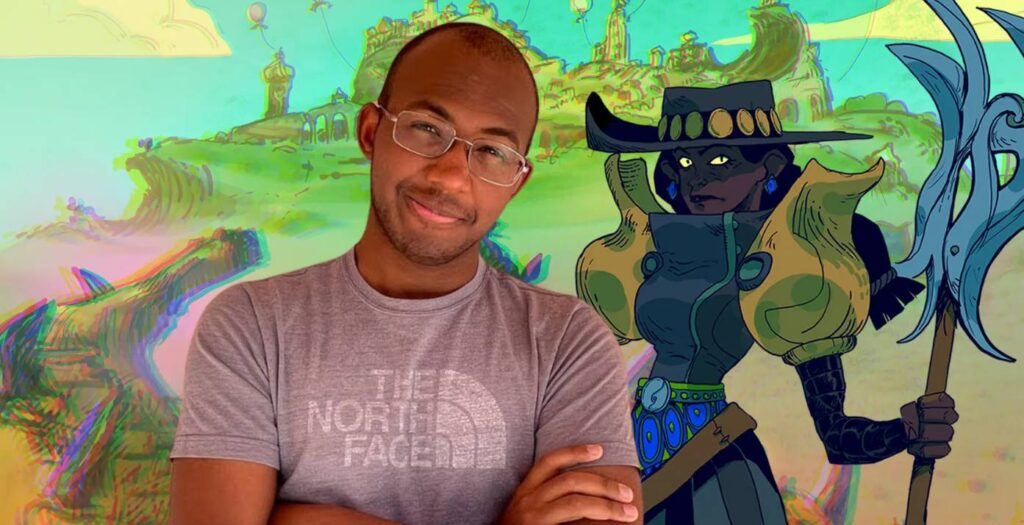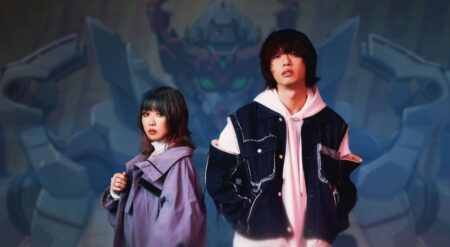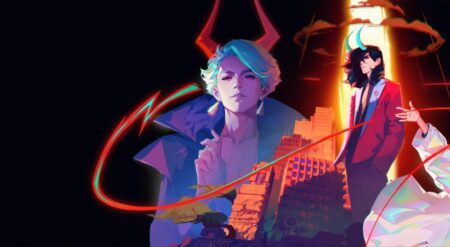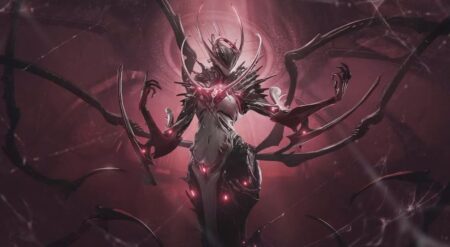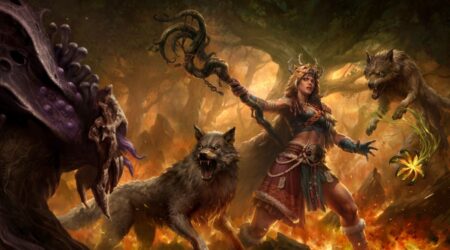Founder of Strange Scaffold and Co-lead and Narrative Director on Defender’s Quest 2, Xalavier Nelson Jr. has worked on over 100 indie games during his time in the industry. We got the chance to speak with Nelson Jr. about his work at Strange Scaffold, the importance of keeping your humanity in game development, why Defender’s Quest 2: Mists of Ruin has his favorite character he’s written, and ultimately, the long road to releasing Defender’s Quest 2.
Developed by Level Up Labs, Defender’s Quest 2 tasks the player to rise above the Mirk and protect their ship from dangers unknown in the latest entry in the classic Defender’s Quest tower defense series. But this entry has been in development for around 10 years. Looking back on the long road to launch, Nelson Jr. added context to just how thorny the development road was and how he became a part of the team.
“The game was in development for 10 years. And right before it began production, the previous creative co-lead of the game got poached [by another studio]. So literally, the publishing agreement landed on the desk of the folks over at Level Up Labs, and one of the people had an opportunity they couldn’t turn down, and we’re really happy for him.” Nelson Jr. continued, “But that left this project that had been 10 years in the making that was looking like it would finally get its shot to begin its path towards release, thanks to the awesome folks at Armor Games, and knock them out of commission and Lars Doucet, knocked on my door and said, ‘You ship games… and you can help us.’ I had the chance to both write the story as well as get the production pipelines in order so that this game could ship, and I’m so proud of the team and what they’ve accomplished, given practically any disaster or act of God you could mention occurred while the game was in development. And we’ve got something really impressive on the other side regardless.”
But shipping a game after many “acts of God” that came its way takes resiliency. And resiliency is something that is being asked more and more of developers in an industry that can seem bleak at times. When asked about building that resiliency, Nelson Jr. was candid about the reality of it—you only have it if you have gone through hardship.
“I think resiliency comes from, unfortunately, encountering a large enough amount of hard knocks,” Xalavier Nelson Jr continued, “I don’t trust anyone whose first game blew up; I am happy for them. But if your first game took off, and you don’t understand what it’s like to have a game get canceled, get delayed, go through publisher nightmares, have members of the team that go through indescribable experiences and can no longer push the project forward or their role in the project massively changes. If you haven’t had to pivot around that, then I’m happy for you. And I hope you get to stay in that state because that is what it means to ship up creative project.”
Neslon Jr. continued to discuss the hardships the development faced, “Because of how long games tend to take to develop, especially these days, they are incredibly prone. If you do not build your dev processes to account for life happening to life happening. In the process of working on Defenders Quest 2, the team had to deal with death, deaths, illnesses, and burnout; one of the CO leads had to leave right before the project started to develop… The art team was all located in a country called Ukraine… and as soon as that contract got signed, suddenly, we’re looking for ways to not just continue to get the game made but how to support our teammates when they are in an active war zone.”
“When you’re your lead programmer, having an unimaginable tragedy occurred to them… That can and has sunk entire projects before, and that’s why I look at Defenders Quest 2 as a bit of a miracle because any one of these things can and has destroyed projects of its scale before,” He added, “The fact that it’s releasing regardless and releasing in a pretty good state and all these big swings it takes in terms of like a new kind of 70s psychedelic sci-fi meets Gorillaz art, a story that’s about the bridging of millennia-old misunderstandings between civilizations as they face a cataclysmic threat. All of those things, I’m just thankful that we got to see this game on the other side. And I do see it as a miracle and something that’s the result of a lot of hard work from a lot of very talented people.”
In an era of AAA studios refusing to see people as people, Xalavier’s story of resiliency regarding Defenders Quest 2 is a testament to his compassion—his compassion for his colleagues and for every developer trying to ship a game. Life will continue to disrupt even the most defined plans. Ultimately, it’s his empathy that stands as a testament to what makes games: humans.
When asked about the industry’s lack of compassion, Nelson Jr. said plainly, “Humans make games, so why you wouldn’t excuse my French, treat your f—ing people who make the video game with dignity and respect.” He continued, “It’s only in the most ruthless business facing terms—if only to ensure a good product—the fact that you wouldn’t treat your collaborators with compassion and respect, and build development pipelines that can be fluid and flexible for when life happens as a result. It astounds me, and unfortunately, a lot of games and milestone schedules are not built to account for the human beings who make them in the first place. And then the players that we need to serve on the other side.”
That empathy also translates to writing, and for Defenders Quest 2, a game with an ensemble cast, Nelson Jr. needed to dig deep. When asked about his personal writing process, and more specifically, writing characters from an empathetic place, he said:
“It’s endless suffering… Writing for an ensemble cast, particularly in a video game, is such a weird and specific challenge. It starts out great, and the further you get into developing that story, juggling the perspectives on the table, screen time of all the characters represented, and especially—that’s challenging enough. Then, once you also bring in the wider metaphors and, you know, nuanced and philosophical meaning and entire and build out entire cultures. In the case of Defenders Quest 2, each chapter becomes harder to write than the last because it’s building this incredible weight that’s pushing you down the more you build it.
“But there was a dev team in need, and the project seemed interesting and exciting. And I would get to tell a story, unlike anything I’ve never ever had the chance to do before… [Defenders Quest 2] produced one of my favorite stories. I’ve worked on nearly 100 games in the past eight years, and this is one of my top three favorite stories that I think I’ve written.”

Defenders Quest 2 is one of his favorite projects because it’s women stand out in the game’s cast. Nelson Jr explained, “I really enjoy the cast of women in this game and how they get to defy the badass woman in a game [trope]. They get to be vulnerable. They get to be weird. They get to be manipulative and chaotic and stoic and just fool people. A lot of game stories don’t give you the bandwidth to show that full spectrum of emotion from everyone in the cast, masculine or feminine or otherwise. So I’m writing scenes of this game and crying because I got to see and feel these characters. [I got to] know them in a way that I hope players come to fall in love with them as well.”
Xalavier dove deeper into the games’ inspiration, “We took things from Tank Girl and Gorillaz and Jules Verne. And we are smashing that together with psychedelic 70s sci-fi… You have hurdles and crabs operating as submarines traveling through the psychic goo, which is corrupting—and a flood that may potentially submerge the entire world. It’s kind of a wild setting.”
But how that inspiration culminates in Defenders Quest 2 with its lead character Evni Hunt gets Nelson Jr. even more excited about what the game means to representation. “One of my favorite characters I had the chance to write, [Evni] is this almost this single-mindedly obsessed and principled person who Captain Ahab-style will pursue this goal, this job, this mission, because of what that means to her and for her. Even if it means the damnation of herself and her crew in the process.”
In reference to Evni’s focus, Nelson Jr. explained, “I think women from diverse backgrounds—particularly—have to take on this weight. I saw it from my mother, I saw from other amazing and strong women in my life. Sometimes, what that can transmute into is a toxicity of its own, ‘survival at all costs.’ This objective must be fulfilled in this way because that’s my center, and I think giving [Evni] even a chance to have an acceptance and redemption arc was cathartic for me in ways I never could have expected.”
Nelson Jr. also found catharsis in other characters as well. He continued, “Having that kind of story about obsession and balancing it with characters who, over the course of it, say, you know what, ‘I don’t want to go’ and ‘This is the suicide mission doesn’t make sense unless it makes sense for me.’ Right? People paint their [lines in the] stand in the face of the one great big mission and find themselves in the process. I think there are a lot of people in this very relatable place where they have to say, ‘f–k it, we ball’ on a daily basis to continue existing. And having characters who will, especially because when this game was written—we’re coming off the heels of lockdown writing this story—we have characters saying, ‘No, actually I’m done balling. I’m done balling, particularly with these people in these circumstances. If I have to ball, I’m going to do it in a way that makes sense for me.’ It’s refreshing.”
To close out the interview, I asked Xalavier what was important for any video game player to know about the development process. To which he responded, “I wish players just had the chance to appreciate the beauty and the madness that goes into every single video game. Every video game is the product of a million small choices made on a day-to-day basis. Sometimes, it is a complex set of considerations to find one unique path through a minefield. Sometimes, someone thought of a cool thing and put it in the game, but sometimes, they didn’t tell anyone. The entire idea of what a game is and how much of it is rooted in individual human beings.”
He continued, “Making a bunch of different choices every day is something that the more I make games—the more I made games with different people—the more I, as a player, found the beauty of video games opening up to me. Because I was no longer saying, wait. Wait, why does the developer make the story bad on purpose? I would find a plot hole, or suddenly, a character switches sides quickly… Especially taking my experience as a journalist and seeing games sometimes have wild shifts and directions over time.”
“Combining that with what I’ve learned as a developer, and how many human beings make choices that result in our favorite video games and in games that could have been great but weren’t allowed to or didn’t end up reaching that bar. I think if players, in general, just knew more of the processes that produced their games and more of the choices than human beings, then they would enjoy their games more because that’s precisely what happened to me.”
He added, “Corporations do not benefit from more human beings being seen. They benefit from faceless products that have scores attached to them and that generate cash. Faceless products are made by an anonymized assembly of people who just tell you that 200 layoffs occurred. [Companies] don’t tell you that the person who made your favorite quest, or the person who made who played that skeleton in a house that made you laugh, or this person who wrote a poem in a game that made you cry, or a person who animated that little easter egg that you saw when he looked at one character when you were supposed to move on for a little bit too long. All of those faces have been hidden from the players. So, that’s why at Strange Scaffold, I keep saying other people’s names, like Lars Doucet, because as soon as you understand that human beings make [games], you will have an entire other additive joy for understanding what decisions those are and where they come.”
Defender’s Quest 2: Mists of Ruin is set to release in 2024.
Defender’s Quest 2: Mists of Ruin Re-Announcement Trailer
WISHLIST NOW: https://store.steampowered.com/app/252190/Defenders_Quest_2_Mists_of_Ruin The Shining Lands are no longer the oasis they used to be. A toxic gas known as Mirk has plagued this land, putting those who venture outside the city walls at risk, and Evni Hunt and her crew might be the only ones able to stop it.

